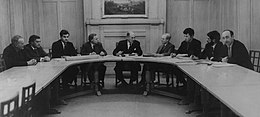Ken Young
Kenneth George Young FAcSS FRHistS (3 January 1943 – 20 February 2019)[1][2][3] was a British political scientist and historian who was Professor of Public Policy at King's College London in its Department of War Studies.
[3] After enlisting in the Royal Air Force, he was stationed at RAF Halton as an armament engineer, but back problems cut his service short.
[3] With those qualifications Young gained admission to the London School of Economics, from which he earned bachelor's and master's degrees.
[5] He then completed his PhD thesis, entitled The London municipal society 1894–1963: a study in Conservatism and local government, under the supervision of George W. Jones, and was awarded his doctorate from LSE in 1974.
[9] Young's networking skills were crucial in recruiting academics from around the world, including future Nobel Prize winner Elinor Ostrom, to publish articles for the new journal.
[17] Of his 1997 book Local Government since 1945, written with Nirmala Rao, one popular text included it in a bibliography as a "useful postwar review" of the subject.
"[9] The bibliography of Gerry Stoker's 1991 textbook The Politics of Local Government has ten separate listings for Young's books, articles, and reports.
The Department of Political Economy at King's College London embodied Ken's belief in the value of interdisciplinary scholarship dedicated to the study of public policy and is an important part of his legacy.
[23] While not all agreed with the conclusions of the Widdicombe Committee's report, City of Westminster chief executive Rodney Brooke wrote that it "present[s] the most extensive and authoritative examination of the internal workings of local government for two decades.
[23] In a follow-on report done in 1990 for the Joseph Rowntree Foundation to examine changes in municipal government since Widdicombe, Young and his colleague Mary Davies found that local councils were putting adherence to partisan politics ahead of the interests of the general public.
[4] The first such article was "The Royal Navy's Polaris lobby, 1955–62", published in the Journal of Strategic Studies in 2002 while he was still at Queen Mary.
[31] It concerned the United Kingdom's Polaris programme, and through archival research showed that contrary to past interpretations, the Admiralty had actively sought a submarine-launched ballistic missile capability and the deterrent role that went along with it and that the programme represented "a naval triumph in terms of Whitehall politics and inter-service competition.
Young's work made use of extensive, previously unused interviews with virtually all the major participants in the decision conducted in the mid-1950s by Columbia University professor Warner R.
[33] A review in Foreign Affairs characterized Young's effort as having produced "a compelling book" that presented "a fresh look at the defeat" of those opposing the weapon,[34] while a review for the Association of College and Research Libraries assessed the book as being "well written, cogently argued, and deeply researched.
[37] In 2014, Policy & Politics journal began awarding an annual Ken Young Best Paper Prize, given to one article published in the previous year's volume that was most "judged to represent excellence in the field".



